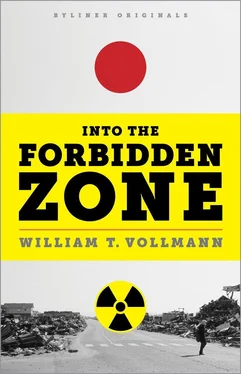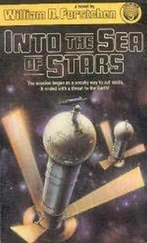Kesennuma , they say, derives from an Ainu word meaning “bay.” Across the street from the harbor whose street sign was buckled and torn and whose power wires were having a bad hair day, the flooded parking garage smelled like the sea and rain spanked down onto the sidewalk. A gaunt cyclist in grubby gray pedaled past, his dust mask down around his neck. The milky-green-gray sea did not seem foul. The rain made the air less dusty, although possibly more radioactive; I never forgot that the dosimeter couldn’t tell the difference. After hauling Professor Morimoto’s boxes of batteries over to the ferry landing I stood gazing uphill across the concrete chunks and through the rebar, over the matchbox-crushed houses, chairs, futons; here was a house whose upper story looked virginal but whose first floor had entirely disappeared except for one wall. The rubble led my gaze up to two red roofs and somebody’s pine tree, which had been manicured into cloudlike lobes of green in traditional Japanese style.
The unevenly humming ferry bore crates of apple juice and other supplies. A long-haired adolescent boy whose shirt said HAVE A NICE YEAR 2009 was one of the many who wore dust masks; the dosimeter was steady at 2.1. A tiny girl in a pink windbreaker sat in her mother’s lap, playing with a toy pistol, laughing gleefully, reaching out uncomprehendingly at a horizon of broken ships. Lumber floated here and there, and another boat lay sunk as if by enemy aircraft. Fingers and claws of wreckage protruded from the chilly sea. After half an hour of filthy slicks, scraps of foam rubber and Styrofoam, a row of multicolored garbage-flecks, a seagull flying very low, a lost bamboo pole, and the orange prow of a ship sticking out of the water upside down like the bill of a dead porpoise, we landed at Oshima Island (165 kilometers from the reactor; population about three thousand), where Professor Morimoto’s student Murakami Takuto awaited us.
The Murakami family’s is the last tsunami story I will tell. They were of old stock, their ancestors marine soldiers who fought on the side of the Heike in that famous twelfth-century civil war, about which so much great literature has been written. The Tale of the Heike opens in a way not devoid of reference to the events of this essay: “The bell of the Gion Temple tolls into every man’s house to warn him that all is vanity and evanescence. The faded flowers of the sala trees by the Buddha’s deathbed bear witness to the truth that all who flourish are destined to decay.” 27
The first floor of their house had been half submerged. The second floor was fine. Almost all of their electrical appliances would have to be replaced, from the rice cooker to the new television to the heating system, which unfortunately and uncharacteristically had not employed natural gas.
In the dining room, which now needed work, Grandmother Fumiko (born in 1933) said, speaking very slowly, tilting her wide, handsome face: “On that day I was in the garden when the earthquake broke out. When it stopped, I came in; there wasn’t much damage, just some glasses and candlesticks. Then I heard the tsunami alert: someone from the fire department calling on the loudspeaker. I cannot run like others. Then I saw the wave: lots of bubbles, so it was white. It was low. And I saw another big wave coming behind it, and so I tried to run. I ran to a higher place. Had I taken the big road I would have been drowned. I took the narrower, higher road. I looked back; the neighbor’s house was floating. After that, I picked up a bamboo stick and used it as a cane. In this city an elementary school is used as an evacuation center. I still live there. I just came here to welcome you.
“In the beginning we couldn’t communicate with anyone. After five days the parents came and I learned that the three grandchildren had survived. It was so scary that I trembled and couldn’t stop. I couldn’t sleep. Friends offered me clothes, rice balls, 28and a futon, so I’m doing fine.”
She then said: “For 350 years our family has been living here, and our ancestors’ saying is that in the Meiji era the big tsunami could not come up to here; therefore this house is safe. If I believed the saying of the ancestors, I wouldn’t be alive.”
“Are you concerned about the accident in Fukushima?”
“The radiation, when it rains, they tell us not to get wet. .”
(Her grandson later told me: “About radiation people on this island don’t know anything.”)
I made my usual remark that after Hiroshima and Nagasaki it seemed particularly sad to me that Japanese were once again suffering from radiation, to which the old lady replied, clasping her hands: “I just want them to be careful.”
“The pines are all fallen and gone,” said the grandmother, stretching out her left hand toward where they used to be, out across the broken trees and sand and over the sea toward the former location of the great rock that the two grandsons used to call their “target” when they swam together. “From here we used to be able to see the sun rising through the pines. We were so proud of that. Now the ocean seems closer. That’s a little scary.”
In the garden she had grown corn, rapeseed, spinach, pumpkins, and white radishes. 29She said, “I feel so lonely now that I have nothing left to work on.”
The interpreter, Professor Morimoto’s student Takuto, and I went for a walk. Down on the futile breakwater of the wrecked beach we found a dripping Chinese book for boys and girls — the property of his late grandfather. “But we never read it anyway,” he laughed, leaving it for others. I found a field now prettily sown with scallop shells, a bamboo grove hung with garbage.
We met a fisherman in an orange jacket; he thought that a third of the island’s inhabitants had died on March 11. He said: “First they ran, then they returned to fetch something important; they didn’t survive.”
“Radiation?” he cried. “No, that’s Fukushima. We have nothing to do with that.”
Walking past him to the end of the concrete jetty was nearly pleasant, the gulls calling from their low islet, the sea wind smelling so delicious that I could not make myself wear a mask, my dosimeter still at 2.1. The setting sun cast a white trail on the water, and a helicopter, probably from the Self-Defense Forces, hummed out behind a cloud. As the day failed, the sad tokens of the tsunami withdrew into the shadow, until Oshima appeared nearly whole.
Takuto said to me: “I would like to do everything I can for this island. I would like to grow up and be a human being and help.”
Although our clothes were getting quite dirty (we expected to discard them after entering the hot zone), that kind and hospitable family refused to let us use our sleeping bags. Father and son laid out futons for the two women, and a bed for me in the adjacent chamber. That meant that the rest of them slept downstairs in those chilly rooms that stank of muck. Our host’s flashlight wavered slow and white around his belly, Professor Morimoto’s cell phone glowing as she and her student giggled over some stupid display, the interpreter switching on her headlamp, which illuminated her face, and I writing notes with the aid of my American flashlight, which was more yellow than anyone else’s.
Although the Murakamis accepted half a dozen cans of American food, they insisted on cooking us dinner. Ashamed and grateful, we came downstairs to the table, where Mr. Murakami’s stubbled, mustached face gleamed in the light of the Coleman lantern. He was the assistant headmaster of an elementary school. After the earthquake, he had permitted some students to depart in the care of their parents. I could tell that he felt guilty about what could have taken place; as it happened, however, they survived the tidal wave. He pressed on me a satellite-photograph disaster map of Oshima. With his spectacles high on his forehead, he showed me the family home on the map. He said: “Far too optimistic.”
Читать дальше












